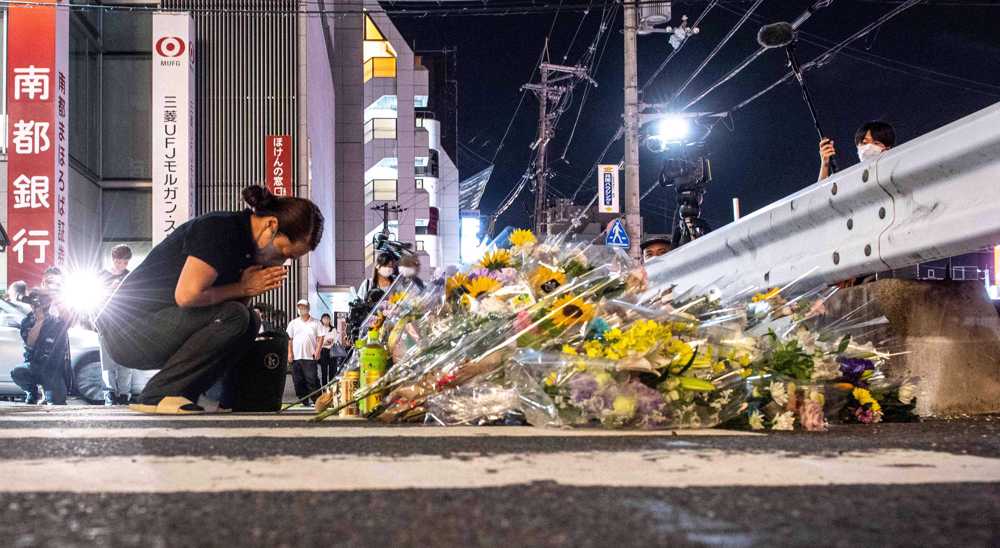International condemnations, reactions pour in after Abe’s assassination
International reactions and condemnations have been pouring in against the backdrop of the assassination of Japan’s former Prime Minister Shinzo Abe.
Abe, Japan’s longest-serving prime minister, was pronounced dead on Friday after he was taken to the hospital for treatment following a fatal shooting that took place at a political rally in Nara, near Osaka, ahead of elections for the country’s upper house of parliament.
Japanese media reported that a man opened fire on the 67-year-old politician from behind with an apparently homemade gun, committing the first assassination of a sitting or former Japanese premier since the days of prewar militarism in 1936.
Police sources told local media outlets that they had arrested Tetsuya Yamagami, a man from Nara in his 40s, and a gun had been confiscated from him. Yamagami was said to have been a member of the Japan Maritime Self-Defense Force for three years.
European Union leader Ursula von der Leyen called the attack a “brutal and cowardly murder,” adding that a “wonderful person, great democrat and champion of the multilateral world order has passed away.”
A wonderful person, great democrat and champion of the multilateral world order has passed away.
— Ursula von der Leyen (@vonderleyen) July 8, 2022
I mourn with his family, his friends and all the people of Japan.
This brutal and cowardly murder of @AbeShinzo shocks the whole world. pic.twitter.com/ztSJnlDsi6
Russian President Vladimir Putin offered his condolences in a message to Abe’s family, saying that a “criminal has claimed the life of a prominent statesman.”
The Kremlin “strongly condemned” the killing, with Russian presidential spokesman Dmitry Peskov saying, “Abe was a patriot who defended Tokyo’s interests at the negotiation table. Thanks to that, he had good relations [with] Putin.”
South Korean President Yoon Suk-yeol sent a letter of condolence to Abe’s family, in which he censured the shooting as an “unacceptable crime.”
German Chancellor Olaf Scholz said he was "stunned and deeply saddened" by the news. "We stand closely by Japan's side even in these difficult hours," Scholz tweeted, expressing his deepest sympathy to Abe's family.
Rafael Grossi, the International Atomic Energy Agency (IAEA) chief, wrote in a tweet that he was “deeply saddened by the tragic death of Japanese Former Prime Minister AbeShinzo. I was honored to meet him and work with him on important issues for Japan. My condolences to his family, may he rest in peace."
Deeply saddened by the tragic death of Japanese Former Prime Minister @AbeShinzo. I was honored to meet him and work with him on important issues for Japan. My condolences to his family, may he rest in peace.
— Rafael MarianoGrossi (@rafaelmgrossi) July 8, 2022
Indian Prime Minister Narendra Modi called Abe a “dear friend” and said his country would observe a national day of mourning “as a mark of our deepest respect.”
US Secretary of State Antony Blinken, speaking on the sidelines of a Group of 20 foreign ministers meeting in Indonesia, said the assassination was “shocking.”
“It’s profoundly disturbing in and of itself, it’s also such a strong personal loss for so many people,” Blinken said. “To the United States, Prime Minister Abe was an extraordinary partner and someone who was clearly a great leader.”
Australia, Sweden, France, Brazil, Turkey, and other nations also condemned the assassination.
Abe held office in 2006 for one year and again from 2012 to 2020, when he was forced to step down due to the debilitating bowel condition ulcerative colitis.
His first term was turbulent, plagued by scandals and discord, and capped by an abrupt resignation.
He was a conservative who pushed for the revision of Japan's pacifist constitution to recognize the country's military and had stayed a prominent political figure even after stepping down.
China voices support for Iran’s stability amid US threats
Border guards seize weapons, ammo cache from terrorists in southeast Iran
VIDEO | Brazil: Uba River floods destroy bridge and buildings, leave people missing
Iran-US negotiators take break after three hours of ‘very serious’ talks
VIDEO | ‘Clear stance’: Iran reiterates its nuclear rights as per NPT, intl. law
Press group: Israel accountable for two-thirds of 129 journalist fatalities in 2025
Iran summons Dutch ambassador to protest diplomat’s smuggling attempt
Iran’s rejection of nuclear weapons based on religious beliefs: Pezeshkian










 This makes it easy to access the Press TV website
This makes it easy to access the Press TV website